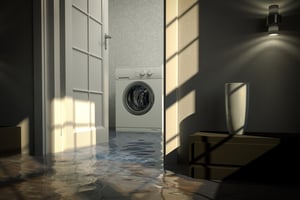 Basement flooding might seem like an afterthought or something that won’t occur anytime soon. However, once it does, it leaves a barrage of damage and stress for the homeowner. Imagine walking into your home and seeing it filled with water and floating furniture— anyone would be speechless at this sight, and not in a good way.
Basement flooding might seem like an afterthought or something that won’t occur anytime soon. However, once it does, it leaves a barrage of damage and stress for the homeowner. Imagine walking into your home and seeing it filled with water and floating furniture— anyone would be speechless at this sight, and not in a good way.
Along with a flooded basement comes mold growth, water damage, and a hefty bill for restoration. Homes with basements require special care and attention because these areas are limited in exits and have little air circulation, making them prone to many problems when exposed to water.
Although a flooded basement might seem unlikely, it wouldn’t hurt to learn some tips to help prevent your basement from flooding. The good news is that these are all straightforward things you can do without professional help.
Actions You Can Take Today
Early detection, good habits, and maintenance are the best prevention methods. Below, we’ll list some things you can do to help prevent your basement from flooding.
1. Inspect Regularly.
Take some time to regularly walk around your home and inspect the foundation and pipes. Flooding can often be caused by leaky pipes or cracks in walls, allowing water to seep in.
You might not have realized that water has been dripping into your home. The foundation can also wear down and eventually deteriorate over time. If you regularly inspect your home, you can catch these cracks and leaks early when they’re smaller. You can seal them yourself without professional help if they're still small.
The sooner you spot any cracks in your walls and pipes, the more likely you can prevent a disastrous basement flood. Contrary to popular belief, new homes are more vulnerable to foundation cracks. This is due to the settling time new houses need, which might take a few years and can lead to vertical cracks in the foundation.
So, if you’re currently building a new home, consider leaving the basement unfinished so you can spot any cracks before sealing the walls. This will save you time and money in the long run because you’ll detect the flaws early on.
2. Reduce Water Usage.
Laundry is a chore you can’t avoid. Clothes are bound to pile up if you don’t wash them. You might not know it, but during heavy rainfall, the use of too much water can potentially overload the sewer system as it’s already working so hard to drain the rainwater.
Overloading the sewer system with too much water can cause basement flooding. Although it will take a lot of water, it’s a good idea to take precautions, and limit water usage during rainstorms and heavy snowfalls. Avoid using too much water during your showers and while doing laundry.
3. Don’t Clog Your Drains.
Municipal storm sewers can experience clogging when excess leaves and other debris fill the pipes. This makes them pump water into the surrounding ground, causing flooding. Similar to this, basement drains that are clogged can lead to flooding. For drains to work correctly, they must be clear of debris or excess. Keep in mind to check drains running through your basement as well.
A simple thing you can do to ensure your pipes are safe from clogging is to avoid putting anything down the drain or flushing anything that doesn’t belong there. Things like diapers, wipes, hair, and paper products, aren't meant to go into a toilet.
4. Check Your Appliances.
Appliances are bound to wear down over time. Whether it’s your blender, refrigerator, or washing machine, every appliance has its own expiration date. So, it’s important to remember to update your appliances.
You can help keep your appliances working correctly by doing routine checks and maintenance. This is especially crucial for refrigerators and washing machines because they use water to function. If your washing machine or refrigerator were to malfunction, it could flood your home.
Wrap Up
Your basement is just as important as any other part of your house. In fact, it could be said that it’s a crucial part of your home. So, you need to put in extra care and maintenance to prevent it from flooding. Fortunately, you can take a few actions without calling for professional help.
Regular inspections, a good habit of not flushing unnecessary things down the toilet, checking your appliances, and using less water during heavy rainfalls are a few practical ways to prevent flooding in your basement.
Author Bio: Diana R. is the business community manager at Basement Guides which is a perfect place for all basement related problems and projects. She helps spread the word about useful and updated guides for anyone interested in basements and restoration.





